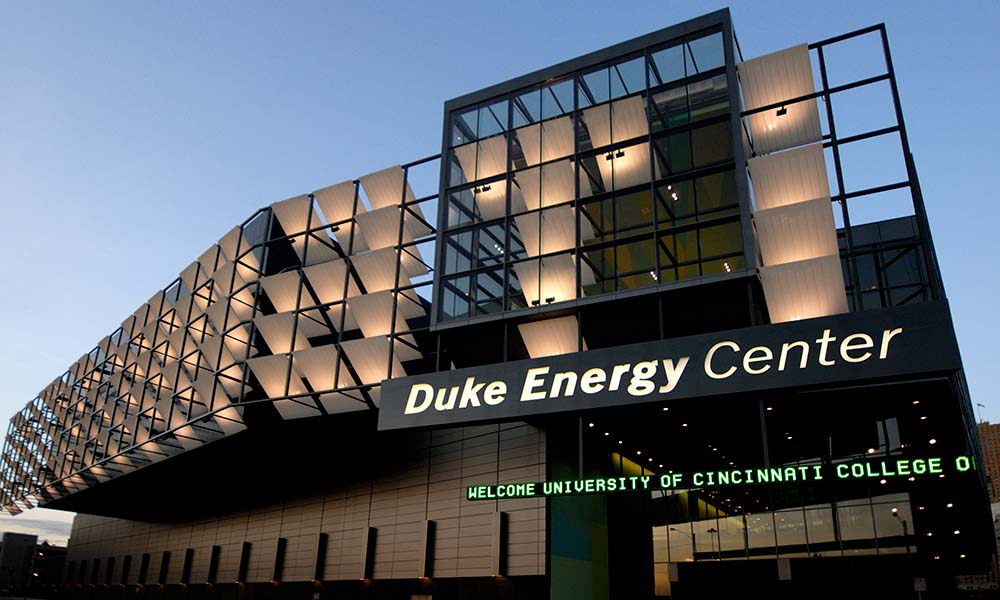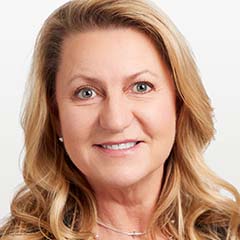
OVG360’s portfolio of convention centers, overseen by Senior Vice President of Convention Centers Shura Garnett, includes the Duke Energy Convention Center in Cincinnati, Ohio.
Shura Garnett has spent more than three decades rising through the ranks of the venue management industry, going from overseeing facilities the St. Charles Convention Center in St. Charles, Missouri, to overseeing entire portfolios of venues for Spectra (acquired by Oak View Group in 2021). Today, Garnett is senior vice president of convention centers for OVG360, a division of the Oak View Group dedicated to full-service venue management and event programming for arenas, theaters, convention centers, and amphitheaters throughout the U.S.
Along the way, Garnett has accumulated a lengthy list of industry awards and risen to leadership positions, including becoming one of the first handful of women elected to chair of the board of the International Association of Venue Managers (IAVM) — an honor she says is one of her career highlights. In her interview below, Garnett recounts her career journey — including the more recent, tougher moments of the pandemic — and shares her advice for young people just starting their own.

I tell people I just raised my hand and said ‘I’ll do it’ for the first 15 years of my career.”
What do you think is the biggest challenge confronting the industry right now?
I think right now it is staffing and rising costs. We are starting to see events come back and spend on the incline, but still not at pre-COVID levels. We’ve traditionally been an industry of long hours and days of working when most people are playing. Many of our industry’s hourly and mid-manager-level employees just exited the industry entirely. Now we are having to pay premium wages through temporary staffing agencies, and we are still short-staffed. Add the increased cost of staffing to increased cost of food, services, and supplies, and eventually either the venue or the meeting planner is the one absorbing those costs. As a result, we are all trying to figure out how to do it cheaper without compromising on quality.
The meetings and events industry has taken many twists and turns over the last two years. Can you talk a little bit about how you have weathered that personally and from a leadership perspective?
I think my experience through COVID was different from many people. I traveled through mid-March [of 2020], stayed isolated for April and May, then the first week of June 2020 through May of 2021 I traveled 46 out of 52 weeks and continued to travel weekly. In the last two years, I have onboarded six new convention centers — that is why I traveled so much. In one instance, this meant having to furlough half the staff in the first two weeks, and another where I had a new venue with only one full-time and one part-time employee. With all our venues working with very limited staff and resources, keeping people motivated and making them feel appreciated was key and it still is.
Are there ways in which you found yourself thinking differently as a result of the ongoing challenges to the industry?
I hope I [was] acting with more empathy, gratitude, tolerance, and flexibility. Empathy towards others in whose lives I impacted with the furloughs. That was not a position I wanted or any of us wanted to find ourselves. Gratitude that I worked for OVG and they had a commitment to maintaining normalcy in the workforce. Tolerance and flexibility towards others with differing points of views, priorities, and thoughts that were different from mine.
Where is there room for improvement in terms of equity in leadership in venue management?
We still don’t have enough female leadership at the executive level. When I first started in venue management in 1988, we had about a 10-percent representation in membership of female leaders within IAVM. From 2006 to 2007, that number rose to 16 percent, and today that number is 34 percent, so we are seeing great strides and improvements in this area!
Can you share a moment that you think was your biggest career highlight? Biggest learning moment?
It is so hard to narrow down to one as I have been so blessed in my career with many highlights! I think it was being nominated and elected to chairman of the board for the International Association of Venue Managers (IAVM) by my peers. I was only the fifth or sixth female to lead the organization in its then 86-year history. I followed Robyn Williams, [then president], and for the first time [IAVM] had two back-to-back female leaders. Since that time, our diversity of leadership has changed dramatically and we are seeing more and more women and people of color acting as leaders within the organization.
During my three-year leadership commitment leading up through my year as chair, I had the privilege of traveling around the world to visit our members abroad as well as those in North America, speaking to them about our industry and organization, implementing many new initiatives, and learning from all of them.
My biggest learning moment would have been from 2006 to 2008, when I chaired the Diversification Committee, and subsequently facilitated the diversification sessions at our annual conference. Learning how broad diversification is and hearing other people’s stories about their life experiences and how they overcame certain challenges was both humbling and inspiring. Today, I still participate in what is now [IAVM’s] Diversity & Inclusive Leadership Committee.
What’s the best piece of advice you were given in your career journey?
There are two that come to mind, and both really helped shape me into the leader I am. Don’t be a bull in a china shop. When I first became a general manager, I thought there was an expectation that I needed to have a thought on every topic and subject that came up. I learned that being a thoughtful listener was even more important, whether it is listening to an event planner talk about the needs of their event so that you can execute it flawlessly or what their budget is or what is most important to the success of their event so you can prepare a thorough proposal. The second was join a professional organization and get involved. The first one I joined was IAVM and it was a career changer for me.
Worst?
I think it was just the implication that I lived and worked in a man’s world and that is just how it was. I remember when Robyn Williams and I broke the glass ceiling of a man’s industry by becoming the first sequential female president and chair of the board for IAVM. I remember how empowered I felt when I fought for salary equality with my male counterparts and received it. So, while it is still predominantly a man’s industry, it doesn’t have to stay that way.
What advice do you have for young people entering the industry right now?
Join a professional organization like PCMA and IAVM and get involved in it. Volunteer every opportunity you get. I tell people I just raised my hand and said “I’ll do it” for the first 15 years of my career. Seek out continuing education opportunities and certifications. Find a mentor and stay connected with them. Many organizations have mentoring programs and will help match you with someone. If you have the opportunity to gain experience in areas outside your field of expertise, take them and expand your experience base. Don’t be afraid to ask questions, as it is just part of the learning process. Lastly, have fun along the way!
Jennifer N. Dienst is senior editor at Convene. This interview has been edited and condensed for brevity.
More Women Leaders
Find more stories from Convene Senior Editor Jennifer N. Dienst’s continuing series on women leaders at convention centers.
